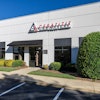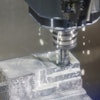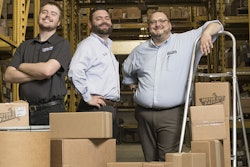For example, on one account that has 200 part numbers, AFI
would send a technician to the job site to manually check
every single bin in the array with a scanner to determine
what to order for restocking. Techs would then upload the
information to their internal systems to produce an order.
They would have to make a return visit to restock the bins.
Sometimes, in order to avoid stock-outs and rush fill orders,
techs would refill the bins above the maximum level, which
represented an added inventory cost.
Seeking a new way of doing things, AFI began looking at
automated bin systems, but ruled most of them out for
being cumbersome or too difficult to use.
However, immediately upon seeing Apex ACTYLUS™ Smart
Bins, AFI president Hugh Watson grew excited.
“We could tell from the get-go that this would be a gamechanger
for us,” Watson said.
ACTYLUS™ Smart Bin System
AFI deployed ACTYLUS Smart Bins with two contract
manufacturing customers that each have facilities of
more than 100,000 square feet. ACTYLUS automatically
sends current inventory levels for each bin to the Apex
Trajectory Cloud™ platform, which then alerts AFI and its
customers when those levels drop to pre-set minimums.
Trajectory reports are viewable on smart phones, tablets
and computers.
This real-time visibility into inventory levels eliminates
the need for counting trips, safety stock and emergency
restocking. Every bin always has enough.
Kent Savage, the founder and CEO of Apex Supply Chain
Technologies®, has launched a number of automatic
dispensing solutions such as ACTYLUS in recent years.
“The trend in business and industry now is to modernize
every stop in the supply chain and drive as much waste as
Assembly Fasteners, Inc. (AFI)
How “Smart Bins” are Improving Industrial Supply Chains
Walk into any of the most high-tech manufacturing facilities,
distribution centers or warehouses, and you’re likely to find
a bin arrangement that feels out of place and dated. Bins,
arranged in rows that are stacked on top of each other,
hold all the vital parts and supplies that keep business
moving – fasteners, tools, tape, wiring, personal protective
equipment and anything else that can be imagined.
But even as the supply chains for other parts of these
operations have become more modern and advanced, bins
are often stuck in the past. Many bin arrangements offer
no visibility into the flow of materials at any given moment,
which leads to a cascading series of impacts that hurts the
bottom line.
Employees who know that the bin system doesn’t work well
end up taking more than what they need so they can do
their jobs without interruption.
This results in chronic stock-outs for other employees,
interfering with the overall productivity of the facility.
Distributors make two visits to complete a single task – one
visit to count what’s in each bin, and another, several days
later, to act on that information and restock.
Management deals with the stock-outs either by placing
costly emergency orders, or sending employees on “milk
runs” for supplies down the street. Many managers choose
to overspend on inventory to keep a backup supply of
emergency stock on hand in the building.
On all of these levels and more, the old bin arrangement is
failing today’s business world. Bins represent an old, manual
process, while the rest of the world is moving to real-time
supply chain visibility and just-in-time delivery.
One Company’s Approach
Assembly Fasteners, Inc. (AFI), a global distributor of
products and services to very large industrial customers,
was working through many of these problems with old
bin systems. AFI specializes in vendor-managed inventory
(VMI) programs in which it manages its customers’ project
inventory levels.
For AFI and its customers, the old method of restocking
bins was time-consuming.
“We could tell from the
get-go that this would be
a game-changer for us.”
Hugh Watson, AFI president
ACTYLUS™ keeps bins full by sending automated reorder
alerts straight to AFI.
In some environments, stock-outs that are caused
by inefficient inventory management can be more
than a headache – they can lead to contractual
penalties for distributors that reach hundreds of
thousands of dollars.
This can happen in complex industries with overhead
and labor costs that are extremely high, such as
pharmaceutical and aerospace manufacturing.
Distributors in these industries may be subject to
major fines if stock-outs slow production. Beyond the
fines, the contracts themselves may be put into peril.
With that level of liability on the line, an extra layer
of pressure falls to distributors to keep their dated
bin systems working, or to find more reliable
technology instead.
possible out of the system,” Savage said. “Because of that,
smart bins have incredible promise. By eliminating all of the
manual effort that was needed to keep the old bin systems
working, employers can keep their labor force focused on
more important work, generating higher productivity and
greater profitability.”
Multiple configurations in the number of rows and size of the
bins are available, so ACTYLUS™ can be customized for any
setting. The clean, LED-lit bins create a solid first impression.
Immediate Savings
After AFI installed the ACTYLUS system, it realized an
immediate savings in both time and inventory costs.
“We don’t lose time scanning bins anymore,” Watson
said. “Now we get alerts by email, place our orders for
replacement parts and make one trip to replenish the bins.”
Technicians who used to spend so much time on manual
counts immediately regained a full day each week because
ACTYLUS checks each bin for them. Projected over an
entire year, they’re saving more than two months of time
that can now be spent on more productive tasks.
“Once the companies that are using old bins sit down
and start doing the math, they start to realize just how
much labor savings are possible by moving to smart bin
technology,” Savage said.
© 2016 Apex Industrial Technologies LLC. All rights reserved. Apex Supply Chain Technologies, Making Spaces Smart®
its mark and Making Spaces Smart are registered trademarks, and Trajectory Cloud, Smarter
Spaces and ACTYLUS are trademarks of Apex Industrial Technologies LLC.
NA-1102 AFINA | ISS 6/16
“At the same time, you’re providing a solution that really
has strong visual appeal,” Watson said. “It replaces dirty,
mismatched old steel shelves with a clean, well-lit system.
When people see it they talk about how they want to move
more of our products into the ACTYLUS Smart Bins, which
helps us to expand our partnership with those customers.”
Immediate Growth
One site had a rack of masking products adjacent to its new
ACTYLUS bins, and immediately gave that business to AFI
so it could expand its use of ACTYLUS.
“They began asking how soon they could get more ACTYLUS
racks installed, so it’s quickly increasing the amount of
inventory we’re providing to that customer,” Watson said.
In other situations, customers who see that they aren’t using
every available bin in their ACTYLUS system are ordering
new SKUs from AFI so they can fill every bin.
Brand Differentiator
Watson says the ACTYLUS solution has become a major
advantage for AFI.
“We work in a competitive industry, so the Apex ACTYLUS
system gives us a different look and appeal. People stop
to look at this when it’s installed. It helps us to separate
ourselves from competitors that are often right next to us
on the shop floor.”
Discover the Distributor Differentiator
To learn more about the ACTYLUS Smart Bin System
from Apex Supply Chain Technologies®,
visit ApexSupplyChain.com/Actylus, email us at
[email protected] or call 1.800.229.7912.
ACTYLUS™ features brightly lit bins to ensure quick and
easy item selection.
Eliminating Safety Stock
With Trajectory automatically notifying AFI to reorder when
inventory levels reach pre-set minimums, there’s no concern
about stock-outs, so safety stock is no longer necessary. AFI
pulled back on the levels of inventory that it placed in the
bins on consignment – returning $11,000 of inventory in
one location and $4,000 in another.
“After we installed ACTYLUS it was like money was falling
from the sky, because we were able to pull back an incredible
amount of inventory,” Watson said.
A quality control manager even wrote up the ACTYLUS
system for ISO continuous quality improvement at one site.
When Stockouts Cost the Distributor, Too
How “Smart Bins” are Improving Industrial Supply Chains
Latest in Home
Cutting Tool Maker Opens New North American Headquarters
September 12, 2025
Metalworking Machinery Orders Up More than 20% in July
September 11, 2025
Milwaukee Tool Announces $42M Expansion in Wisconsin
September 11, 2025






















